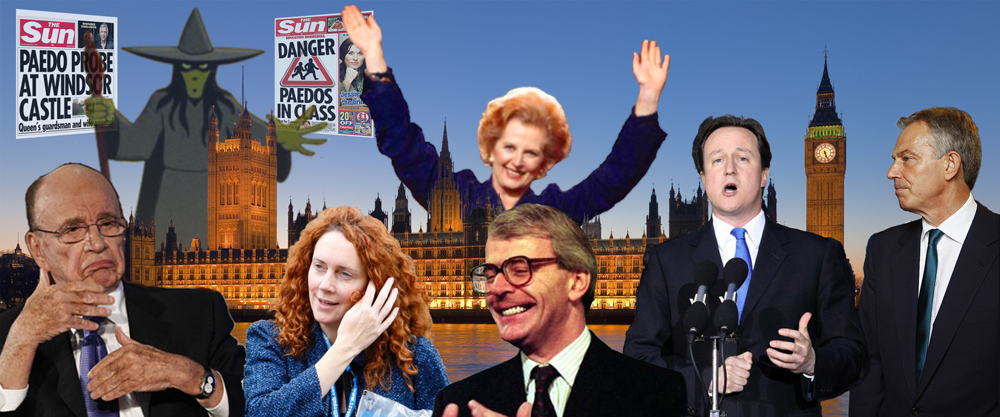
Rupert's
Comeuppance
The
unraveling of a cozy relationship
By Adam Davies
[Webmaster's
note: At first sight, a lengthy article about a British tabloid's rise
and eventual fall would seem a very strange fit for this website. But
what this piece shows is how a publication was willing to sell its
scruples for power and influence and then used that power and influence
to stampede its readership into various quixotic crusades in order to
maintain and increase its power and influence in what looked to be a
never ending circle – until its hubris brought it crashing down like
Icarus. Such a careful dissection of this process can aid us greatly in
understanding the incestuous relationship between our own press and
government and how the two use us as a handy tool to leverage ever more
power to themselves. We'll never effectively fight the harm this tight
embrace causes until we learn to see it. So study this piece carefully
and learn from it.]
The downfall of British Sunday paper the News of the World is a story
with particular resonance for boy-lovers as that paper made itself into
one of our chief tormentors over many years. Perhaps it will yet bring
down the empire of its proprietor, Rupert Murdoch (also proprietor of
large chunks of press and TV in the US, China and many other
countries). But for decades, the combination of Murdoch and the News of
the World seemed like a marriage made in some particularly cheesy
version of heaven.
Founded in 1843, from the start the News of the World pioneered a new
form of yellow journalism, based mainly on reports from the
(small-time) police courts, with a heavy emphasis on the more salacious
cases to be found there. Others soon followed, and by the 1880s much of
the press had been dragged down to the News of the World's level, and
the paper no longer stood out. It was the North London Press that broke
the Cleveland Street Scandal
1,
the Illustrated Police News that led the sensationalism around Oscar
Wilde's trial and the (supposedly upmarket) Pall Mall Gazette that in
1885 published the Maiden Tribute of Modern Babylon.
WT Stead
and Eliza Armstrong and headlines from The Maiden Tribute of Modern
Babylon
Readers will recall that the Maiden Tribute was an epoch-making story
in which the editor, W.T. Stead, bought a little girl and had her
vendors prepare her to be sent to "the Continent" as a white slave.
Although there was a large amount of reportage surrounding it, clearly
the central star of the central story was Stead himself. It was a great
innovation and discovery, that newspapers could so directly and openly
manufacture the news that they would then report. The professional
propriety of it was questionable from the start, especially the extent
to which Stead's enquiries themselves may have generated the offer that
he accepted.
The Maiden Tribute was politically very influential. It helped
establish a new victim culture, and was deliberately timed to create a
panic that would help force through the Criminal Law Amendment Act
1885, and which codified that new victim culture into law. As well as
raising the age of consent to 16, this Act criminalised 'gross
indecency between males', meaning all gay sex (not just anal sex
('buggery'), which had always been illegal). The thinking behind this
was very much like today's thinking about boys. No man in his right
mind, it was felt, would consent to having any 'gross indecency'
performed on him, and so any apparent consent was immaterial, probably
the result of corruption due to having been the victim on previous
occasions. And, as with modern boy-love, it was believed that by far
the predominant form of homosexuality would be a higher ranking or
stronger man imposing himself on a weaker, or else in some way paying
for sexual favors. (This almost certainly led, four years later, to the
next tabloid sensation – the Cleveland Street Scandal.) For instance,
the Oscar Wilde case involved both differences of social rank and gifts
that could be regarded as payments. It is worth remembering that this
was all the work of liberals and helped define what was called the
'progressive era'.

New ownership in 1891 gave the News of the World a shake-up and a new
lease on life. Partly this was by improving distribution, making the
paper more easily and universally available than its competitors. But
this went hand-in-hand with a thorough absorption of the lessons of the
Maiden Tribute, especially the idea of making the paper and its own
reporters the stars, and Stead's other implicit lesson: sex sells. From
now on the News of the World would bring its public a cheap, ersatz
Maiden Tribute, not every week, but often, and as its signature story
type. The stereotype story in its golden era: send an 'undercover'
reporter to some small local massage parlour, where he would aim to
gain a masseuse's trust and negotiate some 'extras'. The reporters were
supposed to excuse themselves before enjoying the extras, but who knows
if they did. The paper would then report the massage parlour -- 'hand
over its dossier' -- to the police and photograph the arrests, but the
story would be mainly about its reporter's daring deeds, titillatingly
not-quite-describing the naughtier bits. Surely this is the true
meaning of sleaze! A further advantage was that, since such stories had
zero topicality or news value, it could run them whenever it liked.
Its sleazy reputation was soon established. George Riddell, its
business manager in the 1890s, belonged to the same London club as
Frederick Greenwood, who had succeeded Stead as editor of the Pall Mall
Gazette. Greenwood affected not to have heard of the News of the World,
so Riddell sent him a copy. Next time they met, Riddell asked what
Greenwood had thought of it. "I looked at it," replied Greenwood, "and
then I put it in the waste-paper basket. And then I thought, 'If I
leave it there the cook may read it' -- so I burned it!"
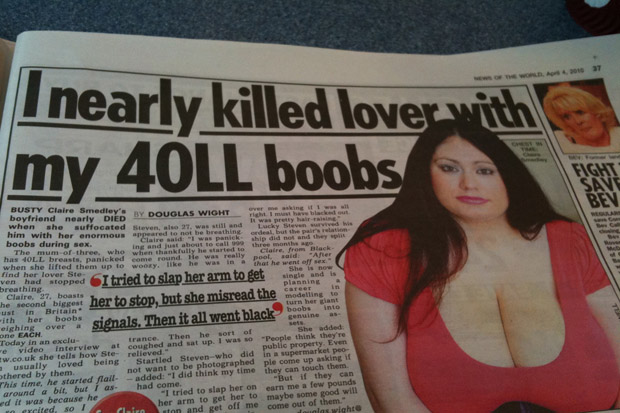
Despite
such discerning reactions from the upper class, the paper became ever
more popular with the British working class, unfortunately having a
large influence on its character. New titles tried to imitate it,
several of them still leading papers today, including the Mail, the
Express and the Mirror, but somehow none of them quite dared to plumb
the same depths. Perhaps this was partly because these parvenus
published daily, whereas the News of the World was always happy to
remain Sunday-only: for the British working class, Sunday was the day
of sanctimonious sleaze.
By the early 1950s, the News of the World was the largest circulation
paper the English-speaking world has ever known, with a regular
circulation a little under nine million and breaking through the nine
million barrier on especially sensational weeks. This was the time of a
major state crackdown on homosexuality, during which Alan Turing was
driven to suicide and Quentin Crisp prosecuted. The paper's exposure of
various homosexual 'vice rings', such as Lord Montagu of Beaulieu,
Peter Wildeblood and friends (and the scout troupe that camped on
Montagu's land) with headlines like 'The Most Evil Men in Britain'
helped it past the nine million mark more than once.
By 1968, newspaper circulations generally had shrunk, but the News of
the World remained Britain's best-selling paper by some margin when the
Carr family, owners since 1891, sold it to Rupert Murdoch, then owner
of a modest but thriving group of Australian newspapers, in preference
to wannabe press baron Robert Maxwell's attempted hostile takeover.
Shortly afterwards, Murdoch also took over an ailing daily newspaper,
the Sun, which he transformed, in his own instructions to his first
editor, into "a hard-hitting paper with lots of tits", taking the
British daily press to a new level of vulgarity and crassness, or
rather making a success of that transition in a way that the Mirror,
Mail and Express had never quite managed, and even now didn't quite
have the brass neck to emulate fully, vulgarity and crassness that
perfectly complemented the News of the World, which he was happy to
leave just as it was. The Sun rapidly became Britain's biggest selling
daily, concentrating on reducing politics to soundbite slogans for
idiots surrounded by pictures of young women with their breasts hanging
out, while the News of the World remained its sleazy old self. It was a
winning combination and the foundation of the greatest global media
empire the world has yet seen.
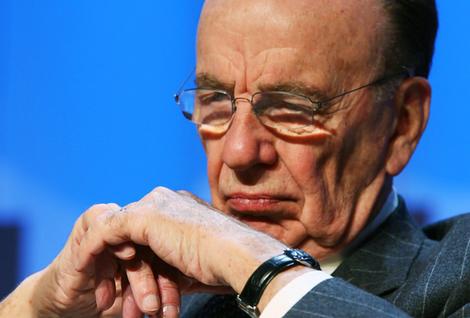
Rupert
Murdoch is the son of Australian press magnate Sir Keith Murdoch, who
first made his name by making bold, sensational claims about the
Gallipoli campaign in World War 1. The fact that these claims ranged
from wild exaggerations to outright fabrications did nothing to blunt
their impact, and much to set the tone of what was to come. They
transformed a young unknown into one of the leading journalists of his
day, and also earned him a role in creating Britain's intelligence
agencies (with which the Murdoch family may have continued to have a
cosy relationship). Keith Murdoch learned the lesson, practiced it
throughout his successful career as an editor and then proprietor in
Australia, and passed it on to his son: big, bold, memorable stories
bring success; truth is a pettifogging detail.
On Keith Murdoch's death in 1952, some of his papers had to be sold
off, but enough remained to give Rupert a good start. He never edited
the papers himself, but took an active interest and somehow brought out
in his editors a unique and highly characteristic level of high-pitched
vulgarity. It was salable from the start and his Australian group of
papers flourished and grew, extending to New Zealand in 1964. But his
entry into the British market in 1968 was a transforming breakthrough,
both for him and us, marrying his sensationalism with the News of the
World's sleaze.
By the 1970s it was becoming harder to persecute gays, but a new target
arose. Dr Frits Bernard had been quietly developing the idea of
self-help and emancipation groups for self-identified pedophiles (both
boy- and girl-lovers) in the Netherlands since the mid-1950s, but in
the early 1970s he gained the support of the NVSH (Dutch Society for
Sexual Reform), at that time a mass-membership organisation, as it was
the only source for birth control products, and organised a series of
international conferences at Breda. From these the idea of organising
as pedophiles spread to young BL and GL idealists across Europe, and in
Britain led to the founding in 1974 of PAL (Paedophile Action for
Liberation) and PIE (Paedophile Information Exchange). It was not the
News of the World, but a smaller imitator, the Sunday People, that
first spotted the opportunity, infiltrating PAL by sending an
undercover reporter along to its meetings, which were open to all
comers, and befriending the leading members, and then reporting on who
they were and (with some dramatic license) what they said. The
conversations were mildly salacious, but for the paper and its readers,
their sensibilities cultivated by generations of
News-of-the-World-style journalism, the main story was that PAL
existed, and the main point of interest was who its members were,
leading to victimisation by neighbours, landlords, employers etc.. The
exposé led to PAL's rapid disintegration.

Murdoch's News of the World was late to the table, but made up for that
with its greed once it got there. Sunday People vs. PAL was a spat
between lightweights compared to News of the World vs. PIE. The paper
ran a relentless campaign of intimidation against individual members
and attendees at PIE events from 1977 to 1983, with non-story after
non-story where people were named as PIE members, often with quotes
attributed to them that were boldly fabricated in the style pioneered
by Keith Murdoch, designed to fit the paper's 'angle' and drench
everything it touched in its own characteristic sleaze. When there was
some actual event to report, such as a PIE spokesperson being barred
from a conference, or if it was a slow time for news, the rest of the
tabloid press would tag along. The strange, hand-in-glove, implicitly
corrupt relationship between the press, especially the News of the
World, and the police and courts, led to two trials of leading PIE
members, in 1980 and 1984, and the jailing of four of them for
political offences. It was with the second of these that PIE gave up
and closed itself down, depriving the News of the World of a regular,
staple source of content.
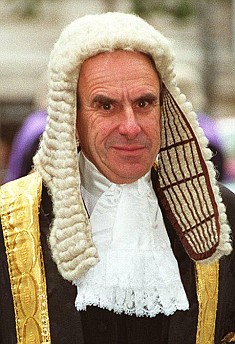
The relationship
between the British press and courts was (and remains) that most judges
share the press's sleazy worldview. It is a curiously one-sided
relationship in that the judges seem to crave tabloid approval and are
known, in sentencing speeches, to thank particular tabloids for their
investigations, while the tabloids just demand more and more, moaning
about soft judges and congratulating only themselves for any courtroom
results they regard as a success. This is an implicitly corrupt
situation but no more, since the judges seem to take this masochistic
stance willingly. Up to the end of the 1980s, when a series of
sensational wrongful convictions could no longer be ignored, it was
combined with a resolute refusal by the courts to find tabloids in
contempt, however outrageous their attempts to influence the outcome of
trials in progress.
With the police, there was an expressly corrupt
relationship well established by the 1970s, that continued into the new
millennium. In story after story, there were aspects that could only
have come from police leaks of confidential information, almost
certainly bought and paid for. No one knows for sure because no one
investigated. Who was going to investigate? But now the spell appears
to be broken, and this corrupt relationship has become one of the arms
of the scandal that has engulfed the press, starting with the News of
the World, and with investigations continuing. But for decades the
tabloids came to regard themselves almost as a branch of the police,
and informally the police concurred, relying on journalists to use
investigatory methods from which they were barred, such as illegal
surveillance and stings.
The early 1980s brought together a set of circumstances in which Rupert
Murdoch was able to lead his press organisation into an implicitly and
perhaps expressly corrupt relationship with government itself. His two
titles were now long-established market leaders, with far away the
largest weekday and Sunday sales respectively (at that time around 3.5
million for the Sun and 4 million for the News of the World), and he
had made enough money from these to be ready for some major
acquisitions. He and the new Prime Minister, Margaret Thatcher
evidently got on well and certainly saw eye-to-eye politically. Both
thought of themselves as libertarians, but both actually had a strongly
authoritarian streak when it came to certain kinds of 'law and order'.
Moreover Thatcher thought of herself as a political crusader, with a
crusader's disregard for the ethics of methods in pursuit of what they
regard as a good cause.
So it was that Thatcher's government used discretionary aspects of
competition law to nod through Murdoch's 1981 purchase of the Times and
Sunday Times while blocking all the other bidders. It was completely
blatant, but that was Thatcher's style. Since then, the courts have
developed some powers to oversee this kind of government misuse of
discretion, but then, even if they had regarded themselves as able to
intervene, they would probably have refused -- taking the line of the
judges who in the 1985 Ponting case stated that the 'public interest'
meant, in law, the interests of the government of the day, no more, no
less. The purchase gave Murdoch's empire a wholly new cachet of
respectability, and his ability to cross-subsidise (a regular Murdoch
tactic), together with a certain limited vulgarisation, enabled him to
bring the Times papers into contention for broadsheet (upmarket) press
dominance. Later in Thatcher's term the government did what it could to
smooth the path of Murdoch's nascent satellite TV business, Sky,
culminating in nodding through its 1990 merger with its main competitor
to produce an effective monopoly, BSkyB, nominally a merger of equals
but in practice a Murdoch takeover.
In return, Murdoch made sure his tabloids gave unstinting support not
only to Thatcher's party, the Tories, but to her wing of it, what we
would now call neocons. Is it corrupt for a proprietor to direct his
paper's allegiances in this way? As time was to show, it certainly had
a corrupting effect.
In 1990 the Tories deposed Thatcher as leader and Prime Minister,
replacing her with John Major. The main policy difference between them
was on British integration into the European Union: Thatcher and
Murdoch wanted less, seeing Europe as a source of bureaucracy and
liberal social policy; Major and most Tory MPs wanted more, seeing
integration as good for business. However, when it came to the 1992
election, with a choice between Major and an outright socialist,
Labour's Neil Kinnock, Murdoch backed Major. After the election, in one
of its most remembered headlines, the Sun claimed responsibility for
Major's narrow victory. Whether it really was "the Sun wot won it" for
Major is still debated, but what is clear is that, as the biggest
selling and most aggressive paper, it was able to run a very effective
campaign to make Kinnock a figure of ridicule, whereas Major, himself
no slouch when it came to ridiculous ideas and tactics, got away with
it. He may have wished he hadn't, because less than six months after
the election his economic policy of European Monetary Union blew up in
his face on 'Black Wednesday', after which he in turn become a national
joke.
The Labour Party had expected to win in 1992, and the loss caused it to
have an existential crisis of confidence, believing that if it could
not win in the conditions of 1992, it could never win again.
Collectively it decided to abandon all of its former policies and
principles and instead concentrate only on making itself 'electable',
meaning in practice acceptable to the tabloid press and especially to
Murdoch. In 1994 the Party chose a messianic new leader to carry this
transformation through, Tony Blair, a worst-of-all-worlds combination
of neocon and politically correct, who immediately began to cultivate
Murdoch. Ironically, by this time no transformation seemed necessary,
as the Tories were completely discredited by Black Wednesday, and
Labour riding high in the polls. Perhaps they feared that even from a
much stronger position than in 1992, the Sun could still snatch victory
from their grasp. Or perhaps they saw the chance of a victory of
epoch-making scale and thought it worth betraying every principle for
that, too. At any rate, the transformation into New Labour, once
underway, was unstoppable. And an essential aspect of New Labour was
its corrupt partnership with Murdoch.
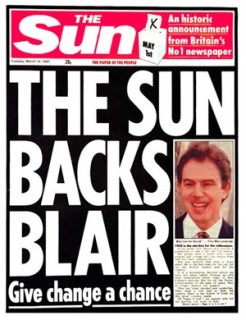
The
transformation paid off, Murdoch switched all his papers to support
Labour in time for the 1997 election, and New Labour won an
obliterative majority of seats (though with only a small plurality of
votes). New Labour, in power, assessed all policy and legislation
primarily by how it would play in the tabloid press, especially the
Murdoch press, and very much including the News of the World. Murdoch
and his editors were now not just feted in the corridors of power but
actively consulted over policy behind the scenes. They must have felt
like untouchable masters of the universe!
The News of the World's obsession with pedophiles was pandered to
firstly by the creation of the Sex Offenders Register, widely regarded
as a pedophile register, which enables police to keep tabs on anyone
convicted of a wide range of vaguely 'sexual' offences; and secondly by
the creation of Sex Offence Prevention Orders, which enable the courts
to impose arbitrary conditions on those convicted of a somewhat wider
range of 'sexual' offences after they have served their sentences. The
Sexual Offences Act 2003 completely rewrote the law in that area,
generally raising penalties and making offences easier to prove. All
penetrative sexual contact with anyone under 13 was henceforth not to
be distinguished from rape. Penalties were also greatly increased for
'child porn' offences, and this interacted with another of Blair's
populist creations, because the new higher sentences made many 'porn'
offences, including some kinds of possession, eligible for the new
'IPP' (
Imprisonment for Public Protection) indeterminate sentences, effectively life imprisonment. To top it
off, in 2009, New Labour made illegal the possession of "disgusting"
drawings of children.
But one tabloid demand New Labour did not accede to was that for
US-style public access to the Sex Offenders Register. This was because
the police, who would have to clear up the mess, advised against.

In
2000, a new editor at the News of the World, Rebekah Wade (since
renamed Brooks after a remarriage), decided to make her mark by
latching on to a recent murder of a child
2,
assumed to have been by a pedophile, in order to campaign for such
access. A main feature of the campaign was that every week the News of
the World would itself publish the names, photographs and approximate
addresses of 50 'convicted pedophiles'.
In the event, the campaign lasted two weeks before the paper gave in to
government and police demands to end it, amid a welter of vigilante
attacks and riots. Partly thanks to the low quality of the photos and
imprecision of the addresses, partly to the usual carelessness of
vigilante mobs, most of the attacks were against people who were not
even those the paper named but had similar names or looked a bit like
them.
In one notorious incident a pediatrician was driven from her home
because pediatrician sounds a bit like pedophile. In the following
weeks there were calls by some MPs for Wade to be prosecuted for
incitement. Instead, New Labour gave her the concession of granting
certain members of the public controlled access to the Register in
certain limited circumstances, so she could claim some kind of victory.
Hauled before the Leveson Enquiry in 2011, she was still citing this
campaign as her prime example of the good that she and the News of the
World had done.
To Wade's time as editor date the earliest and some of the worst
examples of voicemail hacking to figure in the current investigations,
including that of Milly Dowler
3.
The above should make clear that this kind of technique was business as
usual for the News of the World, typical of their 'undercover' methods
over many decades, but perhaps in 2000 there was an especially
poisonous mix of complacency, self-righteousness and arrogance, spawned
by the nature of the partnership with New Labour. On the one hand, they
thought they were untouchable, and rightly so then and for several
years after; on the other hand, for reasons explored above, they felt
that any and every investigative technique was justifiable when used by
them.
One thing that had changed, gradually, since the 1970s, was the
continued rise of celebrity culture. News of the World took part in
this, turning its usual dark arts towards uncovering confidential facts
about celebrities and turning them into front-page gossip. All the
papers did it, but the News of the World was able to use its
established techniques to go further, and darker.
In 2005, things began to unravel just a little. That well-known
celebrity, Prince William worked out that two stories about him in the
News of the World could only have come from someone listening to his
voicemails. The police were called in and their investigation led to
the prosecution of the paper's Royal Editor, Clive Goodman and a
private investigator employed by him, Glenn Mulcaire. Both pleaded
guilty to phone hacking and received short jail terms (4 and 6 months).
The editor, Andy Coulson, resigned but pleaded ignorance on his own
part.
In the months and years that followed a growing number of celebrities
also identified stories that must have arisen from the same method. The
paper faced a burgeoning number of civil lawsuits and set aside
millions of pounds to settle them. The police however refused to
investigate any further. There is some disagreement and mystery over
the reason why. They claimed they had legal advice that gave such a
narrow definition of hacking that investigations would not be worth the
trouble, but the lawyer who was supposed to have given this advice
later denied it. The News of the World began settling civil cases
without admitting liability, and peddled the public line that one
'rogue reporter' had been responsible for a small amount of hacking.

In
their favour was the fact that the Tories now appeared to be following
the trail that New Labour had blazed. They had expected their defeat in
1997, but when they failed to make any recovery in 2001, and only a
weak recovery in 2005, they too had a crisis of confidence, and decided
they must compete with New Labour in courting the Murdoch press. Their
new leader, David Cameron, employed the same Andy Coulson who had
resigned as News of the World editor over hacking, as his
director of communications. The message to Murdoch was that even with a
change of government, his empire's cosy position of influence would be
maintained.
Blair was succeeded in 2007 by the much less neocon Gordon Brown, who
was not content with Blair's fawning relationship with the tabloids,
just as Murdoch switched sides to Cameron's now more obliging Tories.
Brown soon became deeply unpopular, though whether this was more to do
with the Murdoch papers or more with his own character flaws is
debatable. At any rate, he deeply resented Murdoch's change of side,
and the government protection enjoyed by the News of the World seems to
have been lowered.
In these circumstances, one of Murdoch's competitor papers, the liberal
Guardian, began to look behind the News of the World's unconvincing
denials of systematic phone hacking, and itself began to receive leaks
from the police that helped with this. In 2009, the Guardian named a
new tranche of people whose phones had been hacked, including senior
politicians. These names came from Mulcaire's notes, seized by police
in 2005, but the police had done nothing about them, not even informing
the people who had been hacked. This led to a further spate of lawsuits
against the News of the World, and in the course of one of these it
emerged that Mulcaire had been commissioned not only by Goodman, but
also by Ian Edmondson, a senior editor. With that, the paper's "one
rogue reporter" defence fell apart. It now desperately tried to
pre-empt events by switching into 'full co-operation' mode and
volunteering a new tranche of evidence to the police, who began a new
investigation into hacking, Operation Weeting.
In 2010 a new Murdoch-friendly Tory government took power, with
however, the spectre of a Murdoch-hostile Liberal Democrat party as
coalition partners. Murdoch now launched a bid for the BSkyB
cable/satellite TV shares he did not already own. He already had
effective control but wanted to make this unchallengeable and secure a
bigger share of profits. He expected once again that the government
would use its discretion to wave him through the monopolies procedures
in what many assumed was a crude quid-pro-quo for supporting Cameron in
the election.
But the phone hacking affair was not going away and with a gradual drip
of revelations related to it and Operation Weeting, the government's
closeness to Murdoch steadily became more and more of an embarrassment.
In January 2011, Coulson resigned as Cameron's communications director,
blaming the publicity, though still claiming innocence himself.
On 4 July 2011, citing a mysterious police contact, the Guardian
reported that in 2002 the News of the World had hacked the voicemail of
Milly Dowler, a schoolgirl who at that time had been missing for a week
and who it later turned had been murdered. More than that, the
Guardian's source claimed, when the News of the World realised that her
voicemail box was full, they deleted some of the messages, to make room
for more that they could listen to and report on. This caused her
mother to believe that Milly herself had deleted the messages and was
therefore still alive, a belief which the News of the World duly and,
said the Guardian, hypocritically, reported. Checking further the
content of the News of the World, the Guardian noted that the paper had
hardly even bothered to cover up its hacking, directly reporting on
particular messages that had been left for Milly, and saying that they
had been left for her in her voicemail.
Hacking the voicemail of celebrities and royalty was one thing; a
murdered schoolgirl was another. Suddenly the News of the World's
sleaze came back to bite it with a vengeance and it was itself the
target of a massive and irresistible scandal. With its major
advertisers announcing boycotts, and a boycott by readers likely, the
paper closed down, publishing a final 'souvenir' edition that very
weekend, July 10.
Later it turned out that those messages had probably not been deleted
by the News of the World but by an automatic system that cleared them
after a certain time. But that was a detail. The fact of the hacking
was beyond doubt. As investigations continued, it became clear that
News of the World reporters had hacked the voicemails of the parents of
other child murder victims too.
A further consequence was that Murdoch's share purchase at BSkyB fell
through. Cameron gave the task of assessing it to a known friend and
supporter of Murdoch, Jeremy Hunt. But the very fact that Hunt was
known to be so close to Murdoch was going to make it politically too
embarrassing to nod through the deal, and July 13 Murdoch abandoned it.
Since then, information turned up by Operation Weeting has led to two
additional police investigations into News of the World and other
papers: Operation Elveden into corrupt payments to police and other
public officials and Operation Tuleta into computer hacking. These are
still underway – reportedly Tuleta is no more than a scoping exercise
prior to a full investigation. So far there have been arrests of
journalists from the Sun and the Times as well as the News of the
World. Trials have begun of a number of people including former News of
the World editors Rebekah Wade/Brooks and Andy Coulson, though these
are still at an early stage.
Is it too much to hope that Murdoch himself might live to face trial?
He was very much responsible for the standards and methods of his
papers. Although voicemail hacking was probably fairly new in 2002,
because voicemail itself was fairly new, it was typical of the methods
Murdoch always encouraged his papers to use, the more so in the
atmosphere of corrupt political hobnobbing and untouchability that his
empire always sought and benefited from. Since his first acquisition of
the News of the World, he has been known among journalists as the Dirty
Digger, and the nickname is apt.
Perhaps a greater threat to Murdoch's empire is a prosecution in the
United States, e.g. under the Corrupt Foreign Practices Act, as the
courts there are less likely to pull their punches. He could follow in
the illustrious footsteps of another former UK press baron jailed in
the USA, Conrad Black. However, as owner of Fox TV, the Murdoch empire
has become extremely influential in the USA, too. I cannot say whether
it has similar kinds of corrupt immunity, but I would not be surprised.
Still, there is at least the possibility of the entire monstrous
edifice of News Corporation being brought down and Murdoch seeing the
inside of a cell.
So – ding, dong! -- the News of the World is dead at long, long last.
Sadly the attitudes and laws it did so much to foster live on.

